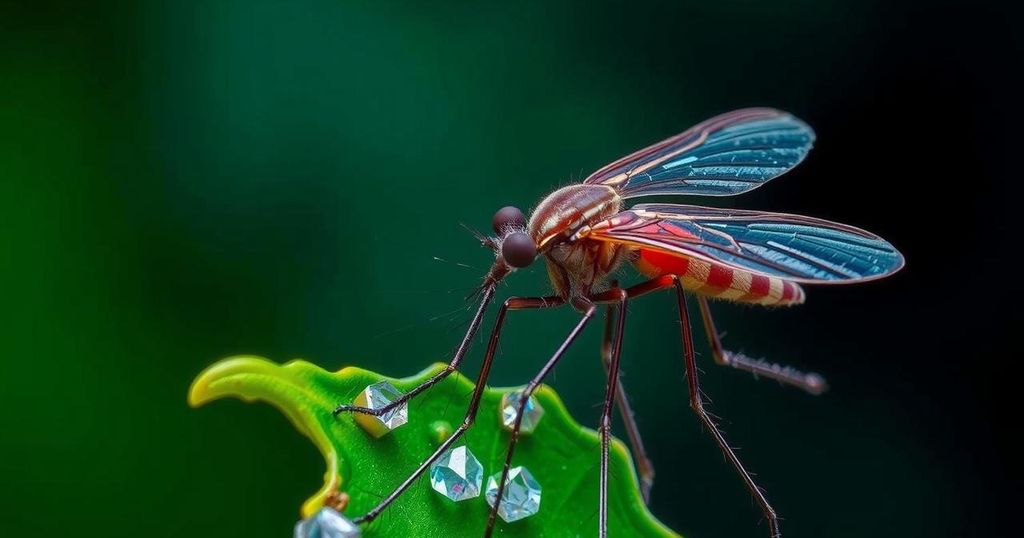Significant Link Found Between Climate Change and Rising Dengue Cases
Research reveals that nearly one-fifth of the global rise in dengue cases is linked to climate change. The study indicates that rising temperatures permit mosquitoes to invade new regions, increasing dengue transmission. Additionally, the introduction of Wolbachia-infected mosquitoes in Brazil displays potential as a preventive measure against dengue, suggesting effective strategies to mitigate the health risks associated with climate change.
Recent research indicates that approximately one-fifth of the unprecedented surge in dengue fever cases globally this year can be attributed to climate change. Scientists have been working diligently to establish a direct correlation between human-induced climate change and extreme weather phenomena, including hurricanes and floods. However, the impact of global warming on health and disease transmission remains an emerging area of inquiry. Erin Mordecai, an infectious disease ecologist at Stanford University, states that dengue serves as an excellent first subject for studying diseases sensitive to climate variations due to its significant correlation with temperature fluctuations. The viral disease, which spreads through the bites of infected mosquitoes, inflicts high fevers and severe body pain and can also lead to fatal outcomes in some instances. Traditionally, dengue has been prevalent in tropical and subtropical regions, but increasing temperatures have allowed mosquitoes to invade new territories and introduce dengue to these areas. The research presented, which has not yet undergone peer review, analyzed the relationship between rising temperatures and dengue outbreaks across 21 countries in Asia and the Americas. According to the study, about 19% of current dengue cases can be linked to historical climate warming, suggesting serious implications for future public health. Mordecai emphasized that temperatures ranging from 20 to 29 degrees Celsius represent optimal conditions for dengue transmission. Elevated regions in Peru, Mexico, Bolivia, and Brazil are projected to experience a substantial rise in dengue cases, potentially increasing by up to 200% over the next quarter-century. The findings indicate that approximately 257 million individuals are presently situated in regions where climate change is likely to double the rate of dengue infections in the near future. Mordecai articulated that this situation provides yet another reason to prioritize awareness and action regarding climate change, underscoring its multifaceted impacts. As of September, the World Health Organization recorded more than 12.7 million dengue cases worldwide this year, nearly double the total for 2023, but experts note that actual figures may be closer to 100 million owing to considerable under-reporting. The research was showcased at the annual meeting of the American Society of Tropical Medicine and Hygiene in New Orleans. In a related endeavor, researchers are exploring a potential strategy for combating the increase in dengue cases through breeding mosquitoes infected with the Wolbachia bacteria, which inhibits mosquito transmission of the virus. In Niteroi, Brazil, where these mosquitoes were first released, the incidence of dengue remains significantly lower during the city’s worst outbreak, indicating the long-term protective capabilities of Wolbachia against dengue. The partnership with the Brazilian government aims to establish a production facility for these mosquitoes to safeguard numerous populations from the escalating dengue threat.
Dengue fever is a mosquito-borne viral illness primarily prevalent in tropical and subtropical regions. It poses severe health risks, with symptoms ranging from high fever and body ache to life-threatening complications. The predictability of dengue outbreaks is deeply intertwined with climatic conditions, especially temperature, which directly influences mosquito populations and their capacity to transmit the virus. Climate change, characterized by rising global temperatures and extreme weather events, poses significant challenges to public health, highlighting the need for comprehensive research on how such environmental factors influence the incidence of mosquito-borne diseases like dengue.
In summary, the correlation between climate change and the increase in dengue cases highlights a critical intersection of environmental science and public health. Researchers emphasize the importance of understanding this relationship as global temperatures continue to rise, impacting disease transmission dynamics. The potential innovation involving Wolbachia-infected mosquitoes presents a promising avenue for combating dengue, demonstrating the necessity of ongoing research and collaboration in addressing the challenges posed by climate change.
Original Source: www.barrons.com




Post Comment